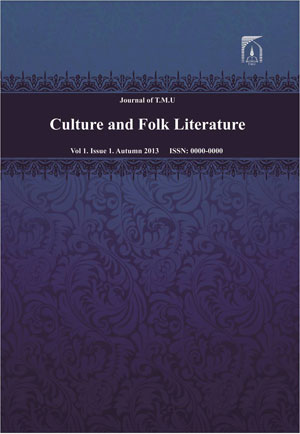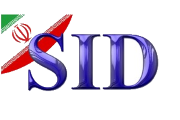Enter your email address
Submit
Write your message









































2345-4466 :pISSN
2423-7000 :eISSN
Culture and Folk Literature
- Editor-in-Chief: Naser Nikoobakht
- Manager-in-Charge: Hayat Ameri
- Publisher: tarbiat modares university
- Journal Type: Scientific
- Publication Period: Bi-monthly
- Access Policy: Open
- Publication Format: Electronic
Aims and scope:
General policy of the journal: Journal of Culture and Folk Literature aims to encourage studies, research projects, and data collection on language, oral literature, and their analysis from linguistic, literary, social, and cultural perspectives. The main approach of the journal is folk literature and its related elements. Papers related to literature are also received and reviewed if they are conducted in the field of folk culture.
List of reviewers with their Publons address
General policy of the journal: Journal of Culture and Folk Literature aims to encourage studies, research projects, and data collection on language, oral literature, and their analysis from linguistic, literary, social, and cultural perspectives. The main approach of the journal is folk literature and its related elements. Papers related to literature are also received and reviewed if they are conducted in the field of folk culture.
| Peer-Review Policy: The peer review process in this Journal is double-blinded in which the reviewer’s name is unknown to the author and vice versa. Submitted articles go through a structural and subject evaluation to make sure they are in line with Culture and Folk Literature principles. Confirmed papers go through a double-blind peer review by three field experts chosen by the Board of Review based on their specialty. Reviewers Responsibilities: The reviewers have the following responsibilities: - Assisting the chief editor in decision-making and potentially helping authors improve papers through editorial communication. The reviewers are asked to decline the review if unqualified or unable to promptly review. - Treating the PDF manuscripts as confidential documents and avoiding unauthorized sharing. - Conducting objective reviews, avoiding personal criticism, and providing clear, supported feedback. - Identifying relevant, uncited published work and reporting potential plagiarism or overlap with other publications. The journal maintains confidentiality of information and ideas, avoiding personal gain or reviewing papers with conflicts of interest. |
| Open Access Policy: Open access and free (all papers) This Journal’s contents and the articles are freely available to readers without subscriptions or payments through the journal website or its permanent repositories. Users can read, download, copy, distribute, publish, search, and refer to the articles without the permission of the publisher or author as far as the articles are correctly cited. |
| Publishing Ethics: This Journal follows all the terms and conditions of the Committee on Publication Ethics (COPE) and complies with the highest ethical standards in accordance with ethical laws and the law regarding the prevention and prosecution of plagiarism. Licensing Policy: This Journal is licensed under the terms of international copyright law of the Creative Commons Attribution-NonCommercial "(CC BY-NC)" |
| Authors fees: Dear authors/ paper contributors, you are being humbly informed that the journal charges 600 thousand Tomans (In two steps: Reviewing: 200 thousand Tomans, and Publishing: 400 thousand Tomans) |
| To receive iThenticate certificate, please refer to the SAMIM NOOR Site at: https://www.samimnoor.ir/view/fa/Default/%d8%b5%d9%81%d8%ad%d9%87-%d8%a7%d8%b5%d9%84%db%8c |
| Self-archiving policies for authors Authors are permitted to post their work online in institutional/disciplinary repositories or on their own websites. Pre-print versions posted online should include a citation and link to the final published version in this Journal as soon as the issue is available; post-print versions (including the final publisher's PDF) should include a citation and link to the journal's website. |
| Copyright Policy : Under open access license, authors retain ownership of the copyright for their content, but allow anyone to download, reuse, and reprint, modify, distribute, and/or copy the content as long as the original authors and source are cited properly. |
List of reviewers with their Publons address
| Scientific ID of the journal International Bimonthly Journal of Culture and Folk Literature |
|
| Journal Type | Scientific (Ministry of Science, Research, and Technology) |
| Publication Period | Bimonthly |
| Editor-in-Chief | Naser Nikoobakht |
| Establishment | 2013 |
| Ranking | ISC (Q1), Ministry of Science (B), Impact Factor (0.495) |
| Ranking | Scientific-research with reference to document No. 3/18/23387 on 14/05/2013 in the committee of scientific journals |
| Average review process | Two months, blind-reviewed by at least 3 reviewers |
| Acceptance rate | 28% |
| Language of publication | Farsi (Abstract: English) |
| Type of publication | Electronic |
| Access policy | Open and free (all papers) |
| Scope | Folk literature, folk culture, language and folk dialect, folk arts, ethnography, criticism and culture and folk literature theories (with an emphasis on folk literature for all areas of research) |
| Address and Contact number | 09333086132 (calls available on Monday from 12 to 16), available all time through message and email at: cfl@modares.ac.ir Research center of Language and Persian Literature, Tarbiat Modares University, Intersection of Jalal and Chamran, Tehran |
| Executive staff | Director: Parnian Zarepour; Farsi editor: Leila Ahmadi; English editor: Ehsan Mehri; Paging: Zeinab Nourpour Juybari |
| Review and publication charge | 200.000 tomans for the review process and 400.000 tomans for the acceptance and publication |
| Bank account No. | Bank account No.: 4001075003007294 Shaba ID.: ir520100004001075003007294 Deposit ID: 386075074140103004110860000000 The payment should be done on the journal’s website (author’s account), which will be done through connecting to the transferring channel of the bank after the primary reception of the paper (before the review process) and after the final acceptance (before the acceptance letter). |
-
Cultural Patterns of Naming People among Mongol Tribes based on Literary and Historical Texts
Azar Molaie Mahoonaki, Ahmad Amiri Khorasani, Ali Jahanshahi Afshar
-
The Analysis of Magic, Rituals and Poems in these Therapeutic Rituals Bushehr Province According to James Frazer
-
Cultural Pathology of the Baluch People based on Proverbs
-
The Typology of the Common Play- Songs Among People of Fars
-
The Representation of Religion in Gilaki Proverbs
-
Analytical Ethnography Of The Native Ritual Performance “Bazaar- e Madineh” in the Mourning Culture Of Women In Bushehr: An Interpretive Anthropological Approach
Ashraf Soltaninia, Mohammad Aref, Abolfazl Davoodi Roknabadi
-
Talisman and breaking talisman in popular caulture of Jabālbārez
-
A Study of Folk Beliefs in the Novel of Fig Tree of Temples
-
The doppelgänger (twin stranger) and its effects in the beliefs of Laks
-
Ekhtelaj in folklore and its reflection in Persian Literature
-
Collecting and Classifying of Ranching Words and Phrases in Satveh Dialect
-
Studying the Beliefs and Elements of Folk Literature in Souvashoun Novel by Simin Daneshvar
-
The superstition Origins and Its Function in People's Life (The Studied Sample: Kerman People's beliefs)
-
Review of versified story of Haidar and Samanbar narrated by the Baluch people
-
Amulet in Folklore Culture: The Case Study of Kerman’s People Folk Culture
-
The Evolution of the Raven as a Motif: From Myth to Folklore
-
Analytical Ethnography Of The Native Ritual Performance “Bazaar- e Madineh” in the Mourning Culture Of Women In Bushehr: An Interpretive Anthropological Approach
Ashraf Soltaninia, Mohammad Aref, Abolfazl Davoodi Roknabadi
-
بررسی و تحلیل مضامین (موتیفها) در لالاییهای آذری
-
بررسی تطبیقی شخصیت کوراوغلی قهرمان حماسی آذربایجان با عنتره بن شدّاد دلاور سوار عرب
-
خُردمردمنگاری فرهنگ ناملموس زبانی خوراک در فرهنگ سنتی مردم مازندران
-
طبقهبندی و تحلیل لقبگذاری عامّه در تهران دوره قاجار و پهلوی بر مبنای زبانشناسی اجتماعی
-
کهنترین فالنامۀ منظوم فارسی
-
مقایسه انتقادی روایت دوگانه رعنا
-
Ethnography of the Marriage Ritual in the South of Fars Province: The Case of Alamarvdasht
-
مردم نگاری آیین ازدواج در جنوب استان فارس
-
تقدیرگرایی در قصههای ایرانی با تأکید بر قصههای هرمزگان
If you have forgotten your password or username, please use the "password recovery" button. At the modern intelligent Yektaweb website, you can access to all TMU Press journals by a single account.
All prevoiusly sent articles to the old website will be reviewed and processed there and you should login to the old website to track your previously submitted articles.
In tha cases of facing with any technical faults or needing help to continue the journal processes, use the "send ticket" button to connect with Yektaweb SAMA Support Center. All questions will be answered asap.











